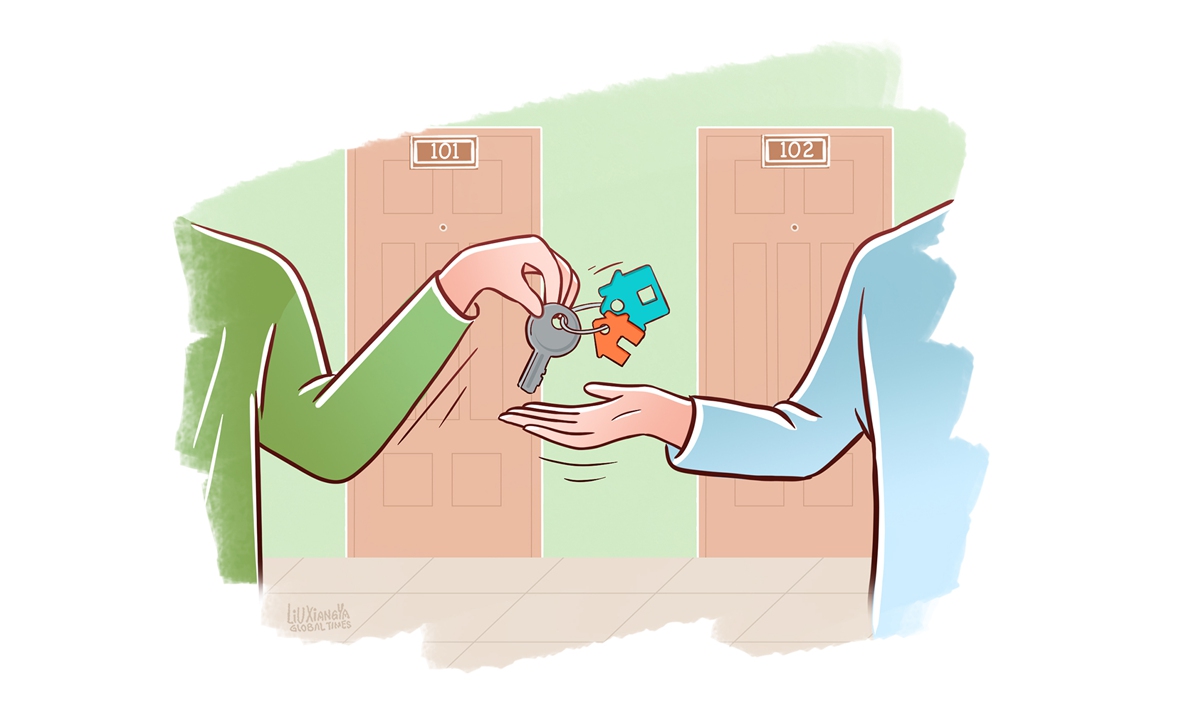ARTS / CULTURE & LEISURE
Heart-warming measures by residential communities bring neighbors close
Sharing small keys, building vast trust

Illustration: Liu Xiangya/GT
"Distant water can't put out a nearby fire, and a distant relative is not as helpful as a close neighbor."This is a wise saying that our Chinese nation has about inter-personal relationships.
After getting home from school, children can go to a neighbor's home to get the keys to their home when their parents are not at home, and sometimes these neighbors even provide them with dinner; when it becomes windy and rainy, those neighbors who are home also help close the windows and put away clothes for those who are not...
Just like a family, neighbors help each other and trust each other. Leaving a key with your neighbors shows a strong level of trust.
As cities develop faster and faster, buildings become taller and taller, nights get brighter and brighter with the addition of more lights, and more and more people move in from other places.
Amid all this, is the human touch growing weaker?
On Beiyuan street in Tongzhou district, Beijing's sub-center, there is a group of people who still use keys to continue the warm friendship that shows how close neighbors are more helpful than distant relatives.
Two sets of such keys lie in a small drawer of a desk belonging to Zhang Jing, Party chief of the Shuaifu Residential Community.
And these keys all belong to community residents, and Zhang has kept one of those keys for years.
Things started in the autumn of 2019 when retired couple Mao and his wife planned to spend the winter in South China's Hainan with the warmer climate.
Before the trip, they worried that there might be problems with the old apartment from time to time, so it needed to be looked after during that long time.
"Zhang, you are the one that we trust most in the whole community, so can we entrust you with our keys?" they asked as they placed the keys to their home on Zhang's desk.
Accepting their trust, Zhang helped check on the house from time to time, especially during the winter season as the heating system in old houses always need to be carefully looked after.
Parking is always a problem for old communities like Compound 55, which has limited space for cars to park.
The residential unit helped solve this problem with a specially arranged half-open gate that allows residents, bikes and delivery scooters to enter the compound while preventing people without parking permits to enter and take up parking spaces.
When residents gathered to discuss how to set up the gate, one of them, a man surnamed Gao, said that it seemed that they had traveled back to old times when "we worked and lived together as a group in the factory."
Residents also put a key in the emergency box next to the gate just in case fire ambulances needed to enter the compound. A human touch returned with this small key.
A "shared key" in the Xincheng Nanjie Residential Community allows children whose parents have no time to take care of them after school have a good place to read, study and play.
Since the end of 2023, the community has set aside a room for after-school activities for children whose parents don't have time to look after them.
Keeping each other's keys, discussing parking issues together, and "sharing keys," these seemingly insignificant actions create warmth between people.
It is not hard to see that China's grassroot community staff are willing to contribute their time, wisdom and efforts as community management in China is people-centered.
Small keys provide practical help and solve big problems. They create mutual trust and harmonious neighborly relations that have been passed down for thousands of years.
These sincere services win people over by warming their hearts.
I still remember an afternoon during the summer. I was doing homework in my neighbor's home as my parents were busy working at their factories.
When dinner time arrived, children from five different families shared a table and food. It was a scene that had been kept in my memories of summer vacation for decades.
I'm glad to see that it will also be part of the memories for more children today.
The author is a reporter with the Global Times. life@globaltimes.com.cn


